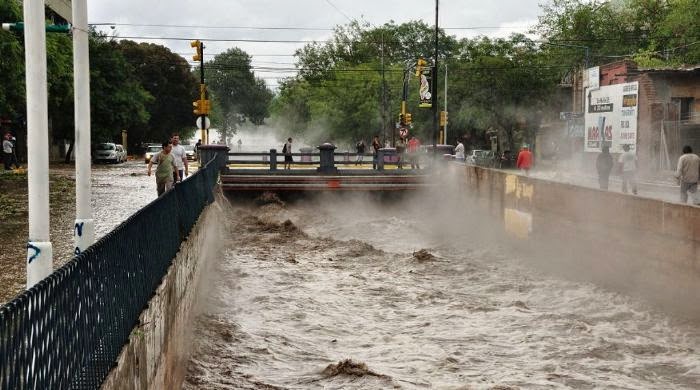
Guaymallén is a municipality in the Metropolitan Area of Mendoza, Argentina, which is known for being one of the main sites for the cultivation of fruits and vegetables for the internal and external market. In recent years, the city has experienced rapid population growth and urbanization in peri-urban areas. Additionally, it has suffered floods that destroy the urban infrastructure and affect the daily lives of the population. One of the most direct (and evident) causes of these floods is the increase of rainfall in the plains, announced in climate change scenarios for the arid Andean region of South America. The increase of rainfall in the past few years is notorious and the floods in urban environments, located in the lower areas of the city, like Guaymallén, are an immediate and natural effect because of the surrounding slopes.
However, there is another set of causes less directly related to the increase of rainfall and the slopes. This other group of causes is associated with a pattern of occupation of the territory of the Andean foothills, as well as the broad territorial transformations and changes of land use in peri-urban areas of the city of Mendoza.
Two major processes trigger these transformations: the encroachment of the Metropolitan Area of Mendoza and the abandonment of cultivated plots. These two processes are linked and mutually reinforcing, creating a feedback loop. But each one has different drivers and impacts. In turn, these transformations of the peri-urban areas pose a threat in a variety of ways: severe environmental damage, impairment of public infrastructure services, alteration of the agricultural matrix, flood risks, social fragmentation, and changes in the landscape and in the territorial identity.
We argue that the transformations that increase vulnerability in the city should be studied in a broader sense, not only considering the participation of hydro-meteorological events but through the impact on risk and vulnerability of a number of other factors (political, institutional, occupation of the territory, economic, etc.).
The research team of INCIHUSA-CONICET initiated a process of rapprochement with the team responsible for the Rural Extension Area at the Faculty of Agricultural Sciences of National University of Cuyo and with professionals and technicians of the National Institute of Agricultural Technology and jointly established the following priority areas to study the impacts of the transformations:
- Environmental transformations: due to the loss of ecosystem services as a consequence of the loss of biodiversity.
- Hydro-meteorological disaster: floods as the immediate effect of the abundant rainfall.
- Social: the modification of lifestyle in the lowland territories, where new settlers (urban and rural) are affected. For example, they experience problems with public services, and problems associated to the different uses (irrigation, drinking) of water.
- Urban Infrastructure: the previous patterns of occupation of the territory (high and low parts of the city), mainly causing drainage problems.
- Food Production: the urbanized lands were previously cultivated and provided a large proportion of the food for domestic consumption. This modifies the productive matrix of the region, the agrarian structure and processes of marketing of crops, mainly horticulture and fruit trees. How is production being affected, and is it being moved to new areas?
In summary, Guaymallén’s problems are not an exclusive product of the occurrence of hydro-meteorological events, but a consequence of patterns of occupation of the territory and waterproofing of the soil in the highlands. While the most direct consequences of this are the constant floods in the city and the collapse of the drainage network, the answer should not come simply from the remodeling of the infrastructure, but from a different planning paradigm. And in pursuit of this objective, science policy collaborative initiatives show promise to help make this paradigm change happen.
